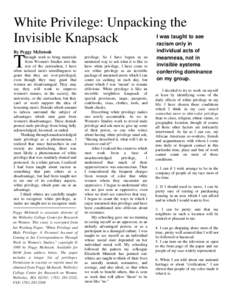

She told me she regularly experienced having her comments dismissed in social settings while her White husband’s were noted. Her ideas and comments were regularly questioned in her career and social settings. She stated that “colour blindness is a purposeful evasion as it does not honour people who do not pass as White.” She further went on to state that “as a Black Woman, I have to deal with the lack of privilege that comes with the colour of my skin.” As a well-educated Black woman, she had experienced being undermined by those who were White. Shaken by my revelation, I spoke to my friend about what I had learned. But when I looked through all the teacher materials and books I used I only noted people that looked like me … they were all White. As an educator, inclusion is very important to me. As I started unpacking this privilege, I saw many inequities in society and commerce as so many people were excluded due to their colour. I never realized how being White gave me so much privilege. As a person who looks White, I had been handed many privileges that those who don’t look White do not have. At this point, I was introduced to the idea of the Invisible Backpack I had carried around my entire life. We spent over a week discussing issues around race, gender, background, and privilege. My view of the world changed when I started my PhD studies in equity and inclusion.
#UNPACKING THE INVISIBLE BACKPACK SKIN#
I never considered that the colour of one’s skin could highly influence their life’s experience. My awareness of skin colour did not change my experiences in my life journey as I accepted people for who they were and how they looked. She came to my door one day and told me my stepfather was “Black.” I realized that she was right in the sense that he had dark skin and did not “look White.” I did not start noticing the differences in my family’s skin colours until my grade 7 friend (who was Black) pointed it out.
#UNPACKING THE INVISIBLE BACKPACK FULL#
In school, my sisters were told they could not be full sisters as they “were not the same colour.” The other sister had darker skin looking very East Asian with dark brown eyes and very curly dark hair. One sister had lighter skin “passing as White” with reddish hair and blue eyes. My half-sisters had different skin colours and different hair. His hair was lightly curled and he had a European shaped nose. His ancestry was East Asian, African, and European. I grew up in a family with a White mother and a stepfather from an African country. As a person who identifies as White, I do not go through life with the same experiences as people who do not identify as White. In a time focusing on the impact of racial equality, Black Lives Matter advocacy is pushing for the human rights of all those who do not identify as White.


 0 kommentar(er)
0 kommentar(er)
